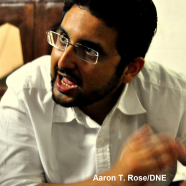Overview
Egyptian national Gehad El-Haddad is the imprisoned spokesman of the Egyptian Muslim Brotherhood. Before his September 2013 arrest, Haddad served as the main point of contact between the Brotherhood and the international media. He also served as chief of staff to the Brotherhood’s now-imprisoned Deputy Supreme Guide Khairat el-Shater. Haddad was arrested in an apartment in Cairo on September 17, 2013, on charges of inciting to kill protesters of former Egyptian President Mohammed Morsi.“Egypt detains Brotherhood spokesman Haddad – officials,” Reuters, September 17, 2013, http://www.reuters.com/article/uk-egypt-protests-haddad-idUKBRE98G0OL20130917;
Ed Payne, “Egypt arrests Muslim Brotherhood spokesman,” CNN, September 18, 2013, http://www.cnn.com/2013/09/18/world/meast/egypt-muslim-brotherhood-arrest/.
Prior to Mohammed Morsi’s June 2012 election, Haddad reportedly volunteered for the Muslim Brotherhood as a media strategist. He also worked at the Cairo office of the Clinton Climate Initiative—founded by former U.S. President Bill Clinton. Directly following Morsi’s election, Haddad began working full-time on the Brotherhood’s “Renaissance Project,” chaired by Khairat el-Shater and described by Egypt Independent as “a 25-year project to reform state, business and civil society, rooted in the Brotherhood’s Islamic values….”Nadine Marroushi, “Renaissance man: Gehad El Haddad works as the Islamist project’s pragmatist,” Egypt Independent, July 31, 2012, http://www.egyptindependent.com/news/renaissance-man-gehad-el-haddad-works-islamist-project-s-pragmatist.
Haddad comes from a family of Brotherhood members and sympathizers. Born in the early 1980s and raised in Alexandria, Egypt, Haddad is the son of Essam El-Haddad, a senior advisor on foreign affairs to former President Morsi. Between 2005 and 2006, Gehad El-Haddad studied strategic marketing and filmmaking in the United Kingdom, where he met and produced a television program with the Islamist Egyptian television personality Amr Khaled. According to Haddad, the program, Sunna al-Hayat, “was about drawing values from the Quran and connecting them with the type of social work that wealthy Egyptians could do to help their societies.”Nadine Marroushi, “Renaissance man: Gehad El Haddad works as the Islamist project’s pragmatist,” Egypt Independent, July 31, 2012, http://www.egyptindependent.com/news/renaissance-man-gehad-el-haddad-works-islamist-project-s-pragmatist. Haddad then worked for a multinational firm, but returned to Egypt in 2006-2007.Nadine Marroushi, “Renaissance man: Gehad El Haddad works as the Islamist project’s pragmatist,” Egypt Independent, July 31, 2012, http://www.egyptindependent.com/news/renaissance-man-gehad-el-haddad-works-islamist-project-s-pragmatist;
“Gehad El-Haddad,” Muslim Brotherhood Daily Watch, accessed February 24, 2017, https://www.globalmbwatch.com/gehad-el-haddad/. According to Haddad’s LinkedIn profile, he began working on the Brotherhood’s Renaissance Project in February 2012, and as the Brotherhood’s “senior adviser & media spokesperson” in January 2013.“Gehad El-Haddad,” LinkedIn profile, accessed February 24, 2017, https://www.linkedin.com/in/gelhaddad/.
In February 2017, the New York Times published an op-ed by Haddad in which he insisted that the Muslim Brotherhood was a purely peaceful organization, following “the values of social justice, equality and the rule of law.” The op-ed came amid increased pressure on the Trump administration to sanction-designate the Muslim Brotherhood under Executive order 13224. Haddad is in “solitary confinement in Egypt’s most notorious prison,” according to the op-ed.Gehad El-Haddad, “I Am a Member of the Muslim Brotherhood, Not a Terrorist,” February 22, 2017, https://www.nytimes.com/2017/02/22/opinion/i-am-a-member-of-the-muslim-brotherhood-not-a-terrorist.html?_r=0. Following the publication of Haddad’s op-ed, his family stated in May 2017, that Haddad was placed in a “punishment cell,” which has no ventilation, beds, toilets, or light.“UN Panel Presses Egypt for Immediate Release of Senior Muslim Brotherhood Figures,” Middle East Eye, October 24, 2019, http://www.middleeasteye.net/news/un-panel-calls-immediate-release-essam-and-gehad-el-haddad-egypt.
A May 2018 Amnesty International report concluded that Haddad’s prison treatment amounts to torture given the time he spent in solitary confinement and other abuses he has been subjected to.“Egypt: End Gehad El-Haddad`s Solitary Confinement and Denial of Medical Care,” Amnesty International, May 28, 2018, https://www.amnesty.org/en/latest/news/2018/05/gehad-elhaddads-solitary-confinement-and-denial-of-medical-care/. Haddad had been in solitary confinement since September 2013.“Egypt: End Gehad El-Haddad`s Solitary Confinement and Denial of Medical Care,” Amnesty International, May 28, 2018, https://www.amnesty.org/en/latest/news/2018/05/gehad-elhaddads-solitary-confinement-and-denial-of-medical-care/.
Haddad was acquitted in September 2019 of espionage charges.Maged Mandour, “Egypt Behind Bars,” Carnegie Endowment for International Peace, February 11, 2020, https://carnegieendowment.org/sada/81045#_ftnref1. However, he remained in custody after new charges were brought against him.Maged Mandour, “Egypt Behind Bars,” Carnegie Endowment for International Peace, February 11, 2020, https://carnegieendowment.org/sada/81045#_ftnref1.
Associated Groups
- Extremist entity
- Muslim Brotherhood
- Read Threat Report
- Type(s) of Organization:
- Non-state actor, political, religious, social service provider, transnational
- Ideologies and Affiliations:
- Islamist, jihadist, pan-Islamist, Qutbist, Sunni, takfirist
- Position(s):
- Spokesman (incarcerated)
The Muslim Brotherhood is a transnational Sunni Islamist movement that seeks to implement sharia (Islamic law) under a global caliphate. Founded in Egypt in 1928, the Brotherhood is the country’s oldest Islamist organization and has branches throughout the world.
